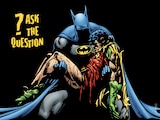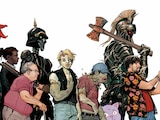Empathy has become a precious commodity. Though, now that I type that, that sentence may be unfair. Empathy has always been a precious commodity. But the beauty of comic book characters is that we can look back at their pages or films and show tangible evidence of their beliefs. Often, we see them focus on Batman’s wrath. He’s easily the darkest member of the Justice League—he is The Dark Knight, after all. However, in celebrating him as the DC hero most likely to just punch his villain in the mouth, a large amount of empathy goes forgotten sometimes.
Batman: The Animated Series is an exceptional and consistent example of that empathy. Bruce Wayne is on a quest to save his city, but there’s an understanding that saving that city sometimes also means saving the citizens that Gotham’s failing mental health system forgot. Batman is often said to have the best rogues gallery of any superhero, and it’s true. But it’s also the one with the biggest number of villains suffering from mental health disorders.
While the nineties were a bit too early for popular media to delve as deep as it could into mental health conversations, Batman: The Animated Series did a pretty solid job. All of the rage, darkness and broodiness that has become synonymous with the character was there, but there was also a mission to truly help the villains he was working to stop.

Rocksteady’s Arkham game franchise also does a good job of balancing that empathy with the sheer brutality that comes along with the character. The best part of the games is when you nail a killer combo against an entire room of thugs and get to watch Bats go to town. Underneath that, though, lies a story of a man who still does his best to save his arch nemesis. The Joker’s spiral is inevitable, but the game takes time to show Batman’s devastation that he failed.
That devastation is rooted in something that is a part of Batman’s core: the fact that he’s not there to kill his enemies. (While recent media has occasionally shifted away from that narrative, we’ve also seen the character turned into a gorilla at one point, so we’re going to stick with the rule rather than the exceptions.)
The Joker has slaughtered countless citizens of Gotham. He’s actively responsible for the death of members of Bruce’s family, both chosen and otherwise, depending on your preferred canon. Still, it’s never about killing him. Batman’s purpose as a vigilante is to save people. That includes the very villains he’s working to stop.

His arch nemesis’ demise isn’t the only time Batman’s been presented with an unwinnable scenario. In Justice League Unlimited, Amanda Waller hands him a device and tells him that Ace (a powerful telekinetic girl weaponized by CADMUS) must be killed before the reality she’s created becomes permanent. The thing is, Ace is already dying.
Rather than use Waller’s device to surprise the girl and kill her off, Batman sits with her and holds her hand as she dies. After being shown empathy for the first time in her life, Ace chooses to revert reality back to normal just before she perishes. Turns out it’s not just Kryptonians that can look an impossible situation in the face and find another way.
Batman walks out of what was once Ace’s fortress with her body in his arms. Some might not find Batman’s action here important. After all, Ace was going to die either way. But that just makes Batman’s actions that much more important. No matter what he did, he was going to have a corpse in his hands. It’s easy to argue that Ace’s death wouldn’t have been his fault when factoring in inevitability. Instead, he chose to hold her hand.

The thing that makes empathy difficult is that it can really, truly suck. Being empathetic means taking on a part of someone’s pain. You feel it with them. You take on the burden so it becomes less unbearable for the other party. No matter how many thugs Batman punches through, and no matter how many times he outsmarts his opponents, that empathy will always be his strongest characteristic.
It's also the one that’s most inherent to him. Bruce Wayne is an expert in pain. Unfortunately, part of him needs it. The pain that he’s experienced, and the pain that he accepts from those around him, is what fuels him. It makes him a better hero, even if his history is chock full of mistakes that he wishes he could take back.
Empathy is hard, but it is also strength. If you can take one page out of Batman’s book, let it be that one. The world is filled with pain, and we all need someone to hold our hands sometimes.
Amelia Emberwing writes about comics, movies and TV for DCComics.com and is a frequent contributor to the Couch Club, our television column. Look for more of her writing on Birth.Movies.Death., Collider and Slashfilm, and follow her on Twitter at @BrowncoatAuror.















